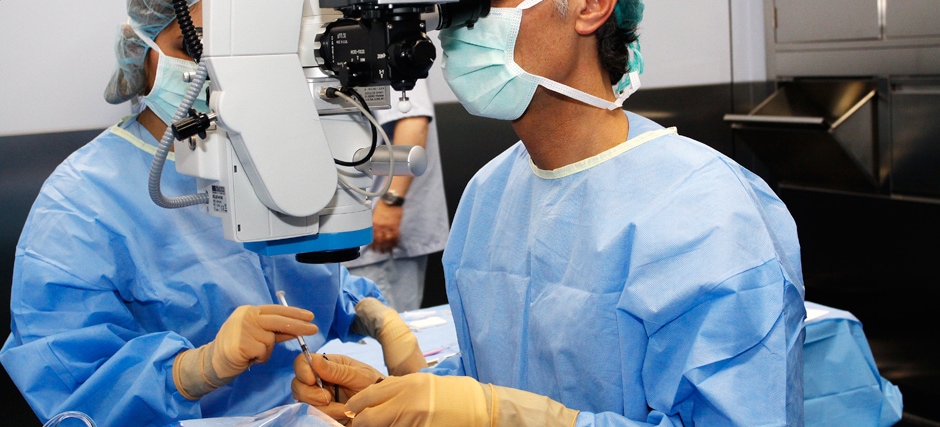Descemet’s membrane endothelial keratoplasty (DMEK)
BOOK AN APPOINTMENT BOOK A TELEHEALTH CONSULTATION
What does it involve?
It is a partial transplantation procedure that enables the selective removal of a diseased endothelial cell layer and its replacement with a healthy one extracted from a donor cornea.
When is it carried out?
Patients with corneal endothelial problems account for about 60% of transplant cases, although very few have benefited from this procedure, because it is not widely used due to its surgical complexity. It enables the corneal endothelium to be replaced by only selecting the inner layers of the cornea without affecting the middle layers.
Prior examination
Comprehensive eye examination.
Before the surgery
The procedure has the same risks as those associated with any kind of surgery. The technique has the important advantage of enabling one donor cornea to be used for two different patients. For example, a patient with damage to only the anterior part of the cornea (keratoconus) can have the epithelium and stroma transplanted, while the endothelium and Descemet’s membrane can be used on a second patient with damage to the innermost layers.
During surgery
Surgery is performed in a controlled manner by means of a microincision that facilitates rapid rehabilitation and prevents fragility in the event of trauma after other types of intervention, counters high astigmatism and precludes the need to use the typical sutures that are characteristic of traditional corneal transplantation (penetrating keratoplasty). As a result, the patient recovers more rapidly, and the level of vision obtained by the receiver (between 90 and 100%) is much higher than can be achieved through traditional transplantation.
Associated pathologies
Experts performing this treatment
FAQs
Most patients who suffer rejection of a corneal transplantation experience reduced vision. Other symptoms include the appearance of foreign bodies and being dazzled or bothered by light.
The patient should avoid strenuous activities and, in particular, avoid direct trauma to the eye.
IMO Institute of Ocular Microsurgery
Josep María Lladó, 3
08035 Barcelona
Phone: (+34) 934 000 700
E-mail: international@imo.es
See map on Google Maps
By car
GPS navigator coordinates:
41º 24’ 38” N – 02º 07’ 29” E
Exit 7 of the Ronda de Dalt (mountain side). The clinic has a car park with more than 200 parking spaces.
By bus
Autobus H2: Rotonda de Bellesguard, parada 1540
Autobus 196: Josep Maria Lladó-Bellesguard, parada 3191
Autobuses H2, 123, 196: Ronda de Dalt – Bellesguard, parada 0071
How to arrive at IMO from:
IMO Madrid
C/ Valle de Pinares Llanos, 3
28035 Madrid
Phone: (+34) 910 783 783
See map in Google Maps
Public transport
Metro Lacoma (líne 7)
Autobuses:
- Lines 49 & 64, stop “Senda del Infante”
- Line N21, stop “Metro Lacoma”
Timetables
Patient care:
Monday to Friday, 8 a.m. to 9 p.m.
IMO Andorra
Av. de les Nacions Unides, 17
AD700 Escaldes-Engordany, Andorra
Phone: (+376) 688 55 44
See map in Google Maps
IMO Manresa
C/ Carrasco i Formiguera, 33 (Baixos)
08242 – Manresa
Tel: (+34) 938 749 160
See map in Google Maps
Public transport
FGC. Line R5 & R50 direction Manresa. Station/Stop: Baixador de Manresa
Timetables
Monday to Friday, 09:00 A.M – 07:00 PM







